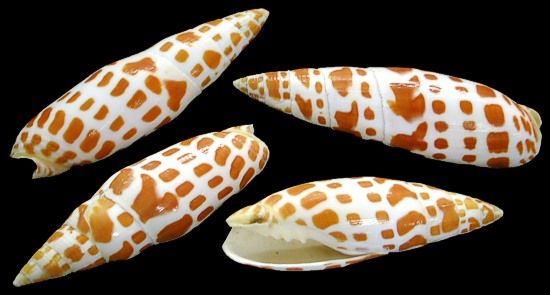A 3 to 4" Mitra Mitra shell
A Mitra Mitra shell specimen measuring between 3 and 4 inches.
Orders usually process within 2 to 5 business days.
Make Your Selections and Shipping Preference. We Will Email You the amount of the Shipping Cost. When you receive the shipping cost go back into Shells-of-Aquarius.company and click into Purchase Shipping Label. There you will find UPS or USPS. Click into the option you decided on and make your payment. Your order will ship when shipping payment is received.
Email: ja1@mindspring.com
Mitra mitra, common name the episcopal miter. Thus the shell got its name from resembling a bishops miter. This species is a large predatory sea snail, a marine gastropod mollusk in the family Mitridae, the miters( Rosenberg, G. (2010). Mitra (Mitra) mitra (Linnaeus, 1758)).
Widespread in the Indo-Pacific, from East Africa, including Madagascar and the Red Sea, to eastern Polynesia. North to southern Japan, Wake Island and Hawaii, and south to Australia (Poutiers, J. M. (1998). Gastropods in: FAO Species Identification Guide for Fishery Purposes: The living marine resources of the Western Central Pacific Volume 1).
This species lives in intertidal and sublittoral zones, to a depth of around 263 feet. (Poutiers, J. M. (1998). Gastropods in: FAO Species Identification Guide for Fishery Purposes: The living marine resources of the Western Central Pacific Volume 1).
Mitra mitra are known to be carnivorous, an active predator that feeds on smaller gastropods and bivalves.
The maximum shell length for this species is around 7 inches, usually to 5 1/2 inches. Like in all Mitridae, the shell is elongate, somewhat fusiform, with a high spire. The aperture is elongate and narrow, and the outer lip is smooth and not lirate (grooved). Unlike other species of the genus Mitra, the spire is not strongly shouldered. The surface of the shell is smooth, with a few weak, spiral grooves towards the anterior end. The color is white, with spiral rows of large irregular orange or red spots (Poutiers, J. M. (1998). Gastropods in: FAO Species Identification Guide for Fishery Purposes: The living marine resources of the Western Central Pacific Volume 1).
